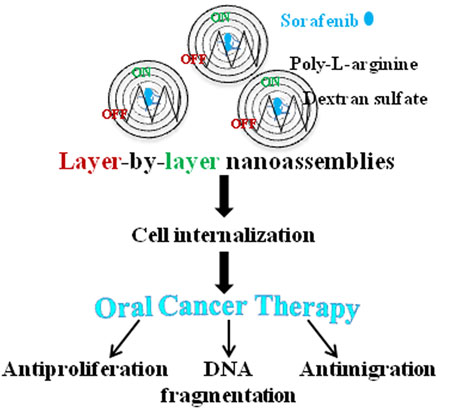| Posted: Jul 27, 2016 | |
On-off layer-by-layer nanoassemblies for oral cancer therapy |
|
| (Nanowerk Spotlight) Oral cancer represents one of the most dreadful killer diseases globally. Researchers at Indian Institute of Technology Bombay, India have developed nano-sized layer by layer (LbL) assembled polyelectrolytes onto calcium carbonate particles to deliver small molecule tyrosine kinase inhibitors to human oral cancer cells. | |
| Calcium carbonate (CaCO3) is a naturally occurring inorganic mineral with a porous structure generates a large surface area. It is biocompatible, biodegradable, acts as a sacrificial core template, and offers the opportunity to capture effectively a myriad molecules of interest like drugs, proteins, enzymes, etc. | |
| The researchers encapsulated sorafenib – a tyrosine kinase inhibitor – in CaCO3 nanoparticles, which was layered alternatively with biodegradable polyelectrolytes to form a multilayer shell. | |
 |
|
| Sorafenib encapsulated on-off layer-by-layer nanoassemblies for oral cancer therapy. (Image: IIT) | |
| The on-off sequential zeta potential cycles of polyanionic dextran sulfate and polycationic poly-L-arginine polymers ensured a compact LbL assembly on the CaCO3 nanoparticles (LbL-nanoSraf). | |
| Physical adsorption, diffusion through pores and electrostatic interactions forms the basis for this layering assembly technique. | |
| The researchers studied the interactions of the synthesized LbL-nanoSraf at an intracellular level. | |
| Analysis using various biological assays revealed that this modality exhibited potent internalization of the LbL-nanoSraf in oral cancer cells resulting in strong inhibition of oral cancer cell proliferation and induced increased DNA fragmentation than free sorafenib. | |
| Since oral carcinoma cells have high metastatic capacity, they exhibit high migratory properties. The LbL-nanoSraf potently blocked the oral cancer cell migration than sorafenib alone, thereby implicating its antimigratory potential. | |
| "The LbL-nanoSraf displayed potent internalization of tyrosine kinase inhibitor, sorafenib leading to potent anticancer effects in oral cancer cells. Designing and promoting LbL-nanoSraf based nanomedicines is a new avenue for oral cancer therapy," concludes Dr. Radhika Poojari, the lead author of the research project. | |
| Further exploration of this modality in in vivo studies are required, which could pave the way for many other diverse applications. | |
| References | |
| Poojari R, Kini S, Srivastava R, Panda D. "Intracellular interactions of electrostatically mediated layer-by-layer assembled polyelectrolytes based sorafenib nanoparticles in oral cancer cells". Colloids Surf B Biointerfaces. 2016;143:131-138. | |
| Poojari, R. et al. (2016). Nanotherapy for oral cancer, Nature India. | |
|
Source: Department of Biosciences and Bioengineering, Indian Institute of Technology Bombay, Mumbai
|
|
|
Become a Spotlight guest author! Join our large and growing group of guest contributors. Have you just published a scientific paper or have other exciting developments to share with the nanotechnology community? Here is how to publish on nanowerk.com. |
|
